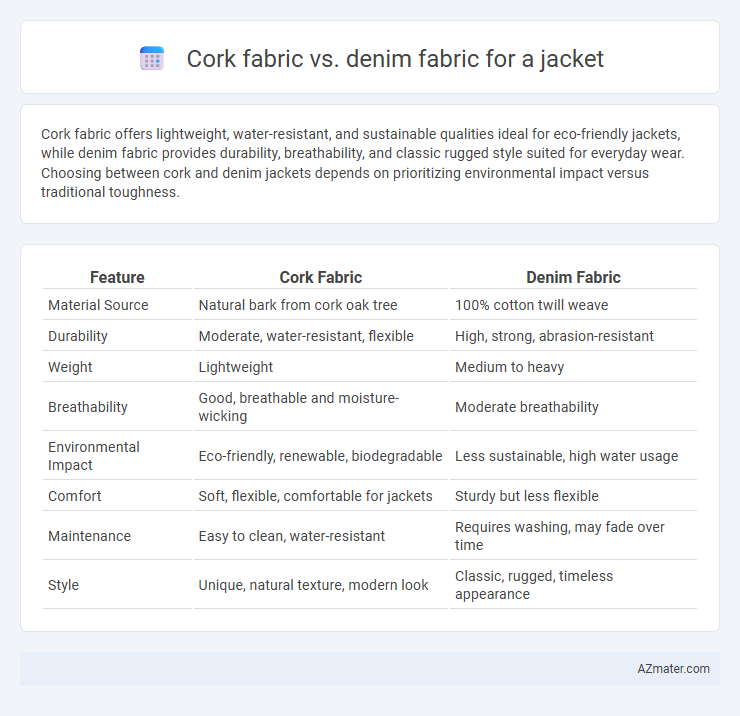Cork fabric offers lightweight, water-resistant, and sustainable qualities ideal for eco-friendly jackets, while denim fabric provides durability, breathability, and classic rugged style suited for everyday wear. Choosing between cork and denim jackets depends on prioritizing environmental impact versus traditional toughness.
Table of Comparison
| Feature | Cork Fabric | Denim Fabric |
|---|---|---|
| Material Source | Natural bark from cork oak tree | 100% cotton twill weave |
| Durability | Moderate, water-resistant, flexible | High, strong, abrasion-resistant |
| Weight | Lightweight | Medium to heavy |
| Breathability | Good, breathable and moisture-wicking | Moderate breathability |
| Environmental Impact | Eco-friendly, renewable, biodegradable | Less sustainable, high water usage |
| Comfort | Soft, flexible, comfortable for jackets | Sturdy but less flexible |
| Maintenance | Easy to clean, water-resistant | Requires washing, may fade over time |
| Style | Unique, natural texture, modern look | Classic, rugged, timeless appearance |
Introduction to Cork Fabric and Denim Fabric
Cork fabric, derived from the bark of cork oak trees, offers exceptional sustainability, lightweight durability, and water resistance, making it an innovative choice for eco-friendly jackets. Denim fabric, a classic cotton twill textile known for its ruggedness and timeless appeal, provides breathability and robust wearability ideal for casual and workwear jackets. Both materials deliver unique textures and functional benefits, catering to distinct fashion preferences and environmental considerations.
Sustainability: Cork vs Denim
Cork fabric outperforms denim in sustainability due to its renewable harvesting process, as cork oak trees are not cut down, allowing continuous bark regeneration every 9-12 years. Denim production often involves intensive water use, chemical dyes, and cotton farming with significant environmental footprints, whereas cork fabric is biodegradable and requires minimal processing chemicals. Choosing cork fabric for jackets significantly reduces ecological impact with its renewable, water-efficient, and biodegradable properties compared to the resource-intensive nature of denim.
Durability and Longevity Comparison
Cork fabric offers impressive durability due to its natural resistance to wear, water, and UV damage, making it a sustainable and long-lasting alternative for jackets. Denim fabric, known for its ruggedness and reinforced cotton weave, provides excellent durability through repeated washes and heavy use but can fade and weaken over time. Compared to denim, cork fabric maintains its structural integrity longer under various environmental conditions, enhancing jacket longevity with minimal maintenance.
Comfort and Wearability Factors
Cork fabric offers superior breathability and lightweight comfort compared to denim, making it ideal for warmer climates and extended wear. Denim fabric, known for its durability and robustness, provides excellent protection and a structured fit but can feel heavier and less flexible over time. Both fabrics excel in wearability, with cork delivering enhanced moisture resistance and denim offering timeless ruggedness.
Aesthetic Appeal and Style Options
Cork fabric offers a unique, natural texture with a modern eco-friendly aesthetic that stands out in jacket design, providing a smooth, lightweight feel paired with subtle organic patterns. Denim fabric, known for its rugged durability and classic indigo hues, delivers versatile style options ranging from casual to edgy, easily customized with washes, fades, and distressing techniques. Jackets made from cork fabric emphasize sustainability and minimalism, while denim jackets accommodate a broad spectrum of fashion statements, appealing to both timeless and contemporary wardrobes.
Weather Resistance and Maintenance
Cork fabric offers superior water resistance and natural UV protection, making it ideal for jackets exposed to wet or sunny conditions, while denim tends to absorb moisture and can take longer to dry. Maintenance of cork fabric involves occasional gentle cleaning with a damp cloth and minimal treatment, as it resists stains and odors naturally. Denim jackets require more frequent washing and can fade or shrink over time, calling for careful laundering and possible fabric reinforcement to maintain durability.
Weight and Flexibility Differences
Cork fabric is lightweight and highly flexible due to its natural cellular structure, making it comfortable and breathable for jackets. Denim fabric, typically heavier and stiffer, provides more durability and structure but less flexibility in jackets. Choosing between cork and denim depends on the desired balance of weight and movement in outerwear.
Manufacturing Process and Environmental Impact
Cork fabric is produced by harvesting the bark of cork oak trees, a process that is renewable and generates minimal waste without requiring replanting, making it highly sustainable. Denim fabric, traditionally made from cotton, involves intensive water consumption, pesticide use, and energy-intensive dyeing processes, contributing significantly to environmental pollution. The manufacturing of cork fabric results in lower carbon emissions and biodegradability, positioning it as an eco-friendly alternative to the resource-heavy and pollution-prone production of denim jackets.
Price and Availability Analysis
Cork fabric jackets tend to be more expensive due to the sustainable harvesting process and limited supply compared to widely produced denim jackets, which are more budget-friendly and readily available in various styles globally. Denim offers abundant options at multiple price points, driven by mass production and extensive retail presence, while cork fabric remains niche with fewer manufacturers and higher costs. Consumers seeking eco-friendly alternatives may opt for cork despite the premium price, whereas denim remains the preferred choice for affordability and easy accessibility.
Best Uses: When to Choose Cork or Denim for Jackets
Cork fabric is ideal for eco-friendly, lightweight jackets that require water resistance and breathability, making it perfect for casual or sustainable fashion wear. Denim fabric is best suited for durable, heavy-duty jackets offering warmth and rugged style, perfect for everyday use and outdoor activities. Choose cork jackets for a unique, vegan alternative with natural texture, and denim jackets for classic, long-lasting comfort and versatility.

Infographic: Cork fabric vs Denim fabric for Jacket
 azmater.com
azmater.com